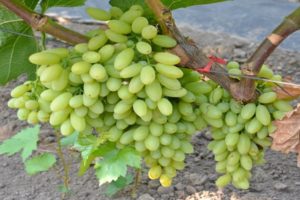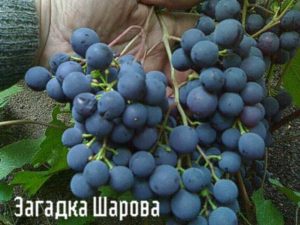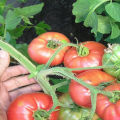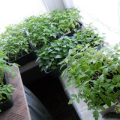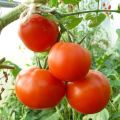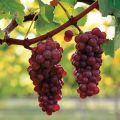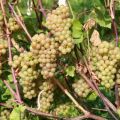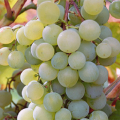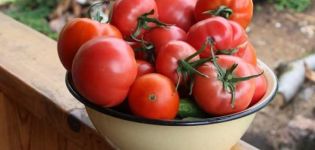Description and characteristics of the grape variety Anthony the Great, history and rules of cultivation
The Anthony the Great grape variety bred in Russia is widespread in the middle and southern zone of the country and in nearby states. The variety has acquired the best qualities of a parental pair of plants and is distinguished by resistance to diseases, juicy and sweet fruits. The hybrid variety does not require specific care and shows a high yield.
Description of grape variety Anthony the Great
Anthony the Great is a medium-ripening grape that takes up to 140 days to ripen. Provided it is properly cared for, the variety shows a stable and high yield.
Origin story
The table white grape variety Anthony the Great was bred by crossing the Radiant Kishmish and Talisman varieties. The breeder V.N.Krainov managed to open a new variety.
Bush morphology
Vigorous and vigorous grape bushes with dense foliage. The inflorescences on the bushes are bisexual, which ensures mutual pollination. The bunches are large, weighing from 0.6 to 2.5 kg, cylindrical-conical in shape.
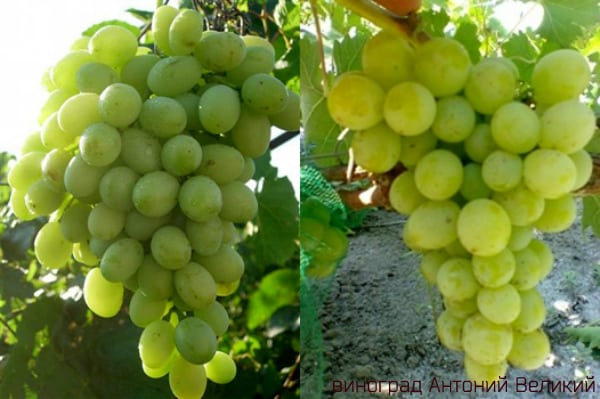
Advantages and disadvantages of the variety
The Anthony the Great grape variety is prized for its many positive qualities. Their list includes the following:
- Frost resistant. The bushes can withstand temperatures as low as -23 degrees without additional shelter.
- Easy to care for. The plant is well compatible with rootstocks and does not require the use of specialized growing methods.
- Stable fruiting. With regular care, the bushes bring a large harvest every season.
The disadvantage of the variety is the need for additional processing to prevent diseases. Another negative feature for some summer residents is unsatisfactory propagation by cuttings.
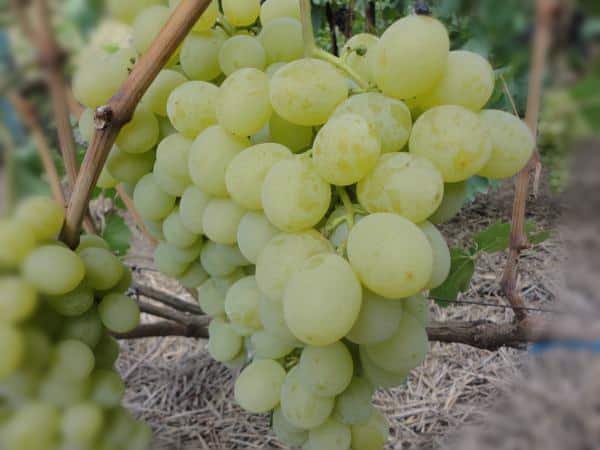
Variety characteristics
The hybrid grape variety shares in part the characteristics of each of the varieties of the parent pair. When choosing seedlings, it is recommended that you first familiarize yourself with the characteristic features of the plant.
High yields
Provided a favorable climate, the absence of infections and proper care, the bushes bring a consistently high yield. Each cluster grows many large berries weighing 15-18 g.
Frost resistance
Plants are able to undergo temperature drops to -23 degrees without consequences. In the case of lower temperatures, covering material is required to protect the plant.

Disease and pest resistance
Variety Anthony the Great has a high resistance to common diseases and harmful insects, with some exceptions.
To prevent the development of downy mildew, constant treatment of green spaces with protective preparations is required.
Description of the berry
The grapes are large in size. The average size of one berry is 30 x 25 mm. The shape of the fruit is round, the color is white or yellow, turning into amber when fully ripe. Inside the berries there are 2-3 seeds.
Tasting qualities
The pulp is of medium density, fleshy and juicy. The skin is soft and tasty. The aroma is rich and harmonious with a predominance of nutmeg. The sugar accumulation rate is high.
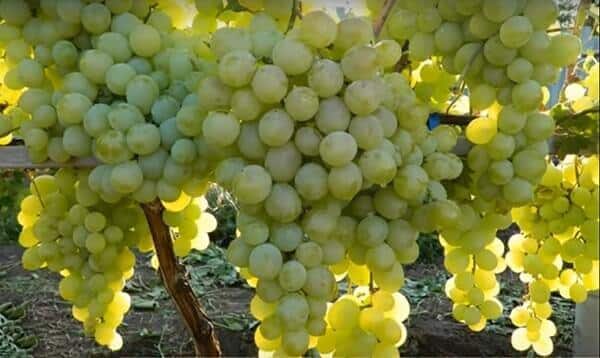
High vitamin content
Berries of the Anthony the Great variety contain an abundant amount of vitamins of the categories A, B, C, E, PP, as well as other useful components. Due to its valuable vitamin composition, the fruits have a beneficial effect on the functioning of the cardiovascular system and the gastrointestinal tract.
Planting seedlings
In order for the seedlings to take root well and in the future bring a consistently large harvest, it is important to observe a number of nuances when planting. It is necessary to carry out preparatory work, choose a healthy seedling and a suitable place for placement, process the site and properly lay the plant in the ground.
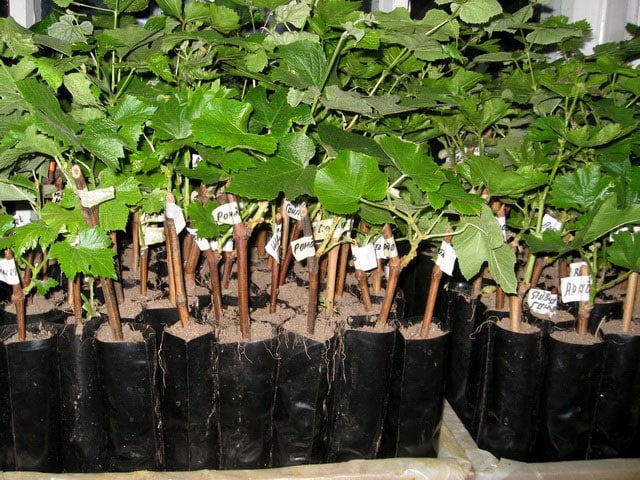
Land preparation
The main stage of pre-planting work is the selection and processing of the site. Suitable for growing grapes are permanently sunlit areas located on plains or hilly surfaces.
Paying attention to neighboring plants
The proximity of certain plants to grapes has a different effect. The development of seedlings is negatively affected by the neighborhood with yarrow, parsley, sage and calendula. Sorrel, dill and strawberries have a beneficial effect on vines. Observance of the correct neighborhood of plants ensures intensive growth of bushes and stable fruiting.
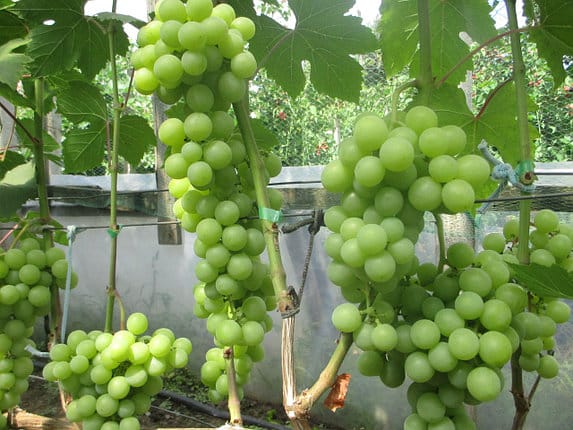
Markup
When marking the territory, the place of planting the bushes is determined. For the free development of roots, the distance between the bushes should be at least 1 m. The optimum spacing of the rows is 1.5-2 m.
Preparing the soil
The area where the grape planting is planned is first cleared of debris, weeds and plant residues. The surface of the earth is covered with a layer of rotted manure and dug up to a depth of 60-80 cm.
Selection of seedlings
When selecting seedlings, it is recommended to carefully examine them to identify defects. The seedlings should show no signs of disease and pest damage. The roots of healthy seedlings are light and firm to the touch.
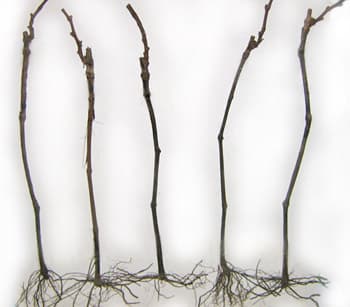
When to plant
Planting grapes is allowed in spring or autumn. In the period from mid-April to mid-May, annual seedlings are planted, and until early July - young vegetative ones. Autumn planting is carried out from the beginning of October until the soil freezes.
Sequencing
The planting process involves performing sequential actions. First, a hole is dug into which top dressing is applied. Then a seedling is placed in the hole and sprinkled with earth. The soil around the bush is watered with a little water for compaction.
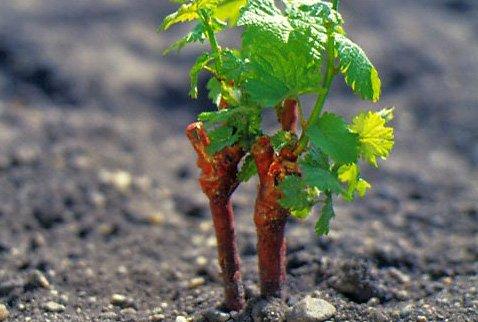
Agrotechnical works
The development of vines and increased yields are promoted by proper care. When growing the Anthony the Great variety, it is enough to follow the standard agricultural techniques.
Pruning and shaping the bush
To give a decorative look and eliminate old branches and leaves, pruning is carried out. The bushes should be formed in early spring or early autumn.
Watering
Seedlings are watered as the earth dries up. The exact amount of watering depends on the climatic conditions. As a rule, it is enough to wet the bushes 2-3 times during the season.
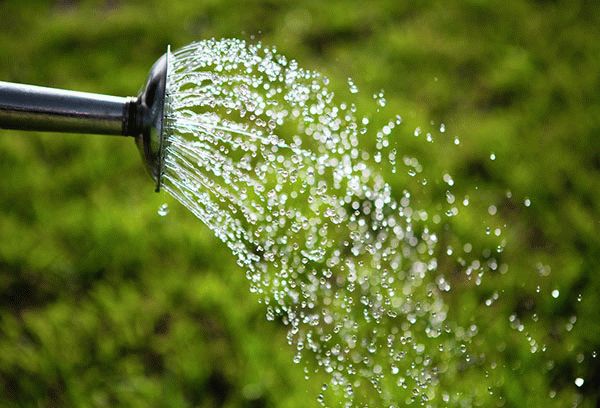
Fertilizer
For the growth of grapes, the application of complex fertilizers with a high content of phosphorus, potassium and nitrogen is required. It is enough to fertilize the bushes in early spring and 3-4 weeks before harvest.
Disease protection
Having found signs of damage to plants by diseases, it is necessary to carry out treatment with fungicidal preparations. Since the Anthony the Great variety is susceptible to downy mildew, it is recommended to periodically treat the bushes for preventive purposes.
Pest control
Insecticides are used to destroy harmful insects that gnaw the leaves and fruits of grapes. When spraying bushes, contact with clusters should be avoided, since some preparations contain harmful components.
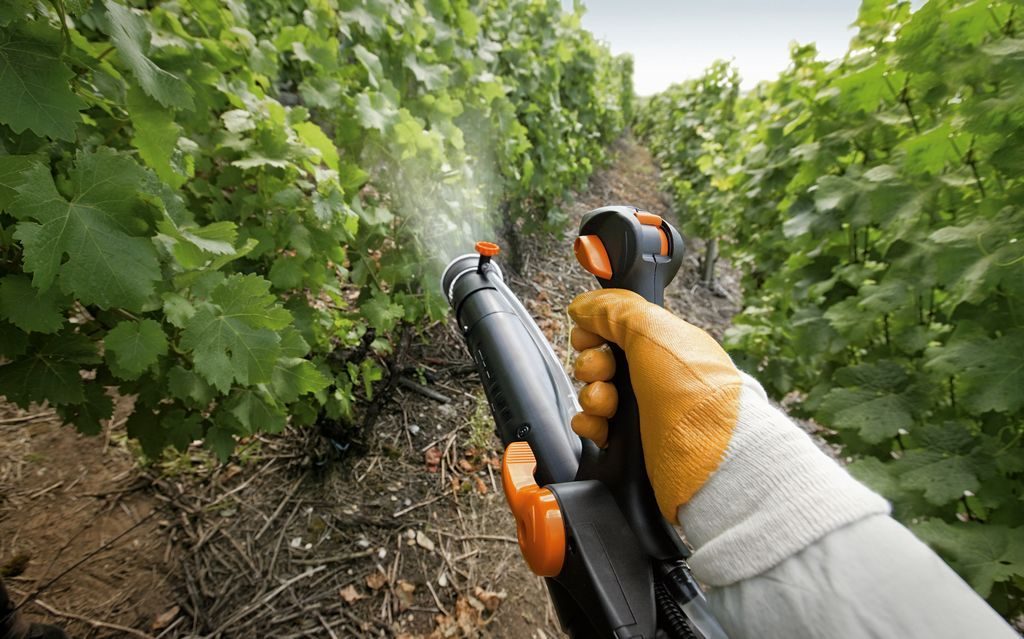
Maturation
Berries of the Anthony the Great variety begin to ripen 135-140 days after the beginning of flowering. Ripe fruits acquire a rich amber color.
Fruiting
In most cases, grapes begin to bear fruit 3-4 years after planting. For the accelerated development of the bushes, favorable climatic conditions, careful care and fertilization of plants are required.
Preparatory work before winter
In anticipation of the first frost, it is recommended to protect the bushes with a covering material. The presence of protection will ensure the optimal temperature and prevent plant death.

Harvest
The grape harvest is suitable for fresh consumption or processing. So that the fruits do not lose their taste characteristics, it is important to collect them correctly and follow the storage rules.
Collection
Bunches with ripe fruits are carefully cut with garden shears or secateurs. Picking the bunches is not recommended as this can damage the vines.
Storage and transportation
Store the harvested crop in a refrigerator or dark cool place. If it is necessary to transport grapes, it is enough to put the bunches in wooden boxes in 1-2 layers.
